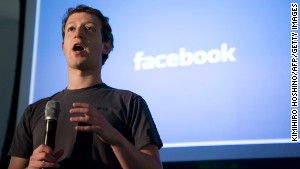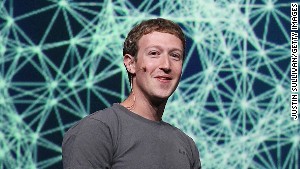Editor's note: Ben Popper is a business editor at The Verge, an online website that covers technology, science, art and culture. Follow him on Twitter: @benpopper
(CNN) -- Mark Zuckerberg believes that connectivity is a human right. Or at least that's how he's framing his new project, Internet.org, a partnership with leading companies in the smartphone industry to bring Internet access to the developing world.
You could be generous and call this enlightened self-interest, but more likely, Internet.org is a canny business move dressed up to sound like charity.
In his overly earnest manifesto about the project, Zuckerberg declares, "For almost ten years, Facebook has been on a mission to make the world more open and connected. For us, that means the entire world — not just the richest, most developed countries. We've made good progress, and today we connect more than 1.15 billion people through Facebook each month. But as we started thinking about connecting the next 5 billion people, we realized something important: the vast majority of people in the world don't have any access to the internet."
 Ben Popper
Ben Popper In other words, how do we help these people become our customers?
Companies that support Internet.org include Ericsson, Mediatek, Opera, Samsung, Nokia and Qualcomm. They make their money building smartphones or the systems and services that help them run. Internet.org has a three-part plan for achieving its goal.
1. Develop cheaper means of access, specifically low-cost smartphones.
2. Find data efficiencies that will allow services like Facebook to work with less bandwidth.
3. Create business models that will incentivize companies of all types to provide cheaper, more plentiful Internet access in the targeted regions.
 Zuckerberg's Internet plan realistic?
Zuckerberg's Internet plan realistic?  Zuckerberg pushes web access for all
Zuckerberg pushes web access for all While this outline sounds refreshing, the fact is, Facebook and its partners have been pursuing them quite actively already. Internet.org is simply benevolent branding on what these companies were hard at work doing.
Samsung and Nokia, for example, have been pushing their way into developing markets with low-cost smartphones.
In terms of data efficiency, Facebook has developed two projects, Facebook Zero and Facebook on Every Phone, which allow the social network to run on feature phones with little bandwidth. These apps have propelled Facebook's recent growth in Africa and Mexico.
New business models have emerged in regions like the Philippines, Mexico and Egypt, where Facebook partnered with handset makers and mobile carriers to preload its services onto phones in exchange for incentivizing upgrades and more expensive data plans.
Will Zuckerberg's new initiative operate differently than these existing ventures?
The name certainly implies so. The .org domain it uses in its name is one of the original top-level domains created specifically for nonprofits. Today, it is also used by academic institutions, open-source and community projects, and the philanthropic parts of for-profit corporations.
A number of articles mistakenly referred to Internet.org as a nonprofit. It's easy to see how they were confused. In the opening lines of his essay about the new project, Zuckerberg writes, "It may not actually be profitable for us to serve the next few billion people for a very long time, if ever."
Actually, developing countries have been the fastest-growing regions in terms of new revenue for Facebook over the past year, something its investors are keenly aware of. Read a few pages deeper into the essay, and Zuckerberg clarifies one thing. "We believe it's possible to sustainably provide free access to basic Internet services in a way that enables everyone with a phone to get on the internet and join the knowledge economy while also enabling the industry to continue growing profits."
Bringing Internet access to everyone is a noble goal for sure, but that's not why Zuckerberg, as CEO of a public company, is pursuing it. He wants to make sure that when people in emerging markets like Africa, India and Asia get their first smartphones and connect to the Internet, Facebook will be the one to greet them.
Follow us on Twitter @CNNOpinion.
Join us on Facebook/CNNOpinion.
{ 0 comments... read them below or add one }
Post a Comment